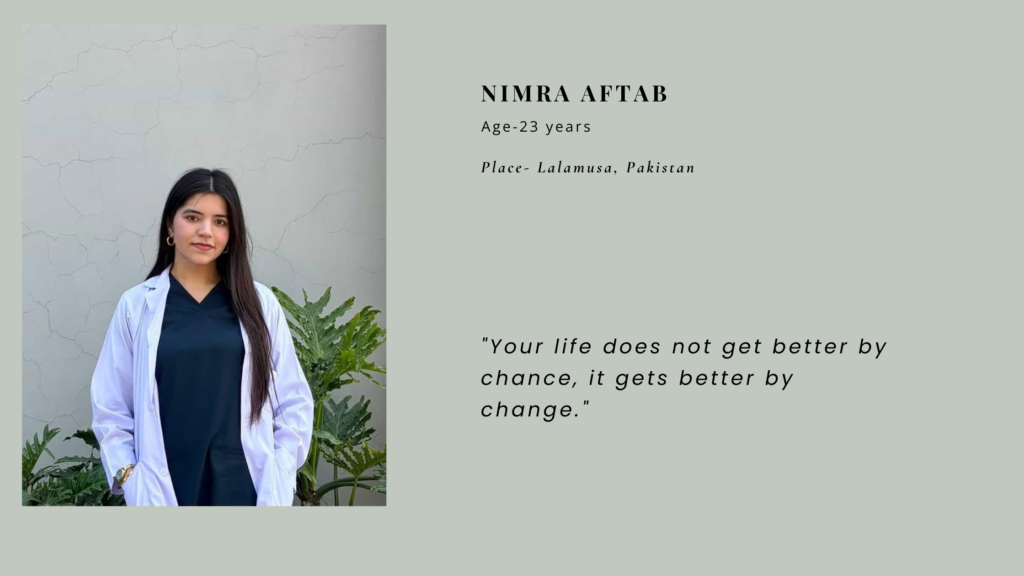Selection Stories
As you might already know, nutrition is one of my favorite topics. I try to eat better—at least most of the time. And yes, I often fail. But that doesn’t stop me from enjoying conversations about food and nutrition.
In the past, I’ve had a chat on this topic too (I’ll drop the link at the end). Today, my search led me to someone who’s actually studying BS in Diet and Nutrition—and has some really thoughtful views on food.
Meet Nimra Aftab, a 23-year-old from Pakistan. She believes that food is not our enemy, and that it can be both tasty and healthy at the same time.
Let’s read the full conversation and take away something good from it.

Q1) What is the meaning of nutrition in very simple terms?
Nimra: For me, nutrition is all about eating foods in the right quantity to support your health and goals.
Q2) How do you handle cravings, especially for junk food?
Nimra: I love making healthier versions of junk food, so handling cravings is easy for me. I just recreate those meals at home in a way that tastes great but is better for my health. But I also don’t believe in being too hard on yourself — eating junk food to satisfy your cravings once in a while is totally fine.
Q3) Have you noticed a link between your diet and your mood or mental health?
Nimra: Yes! Every time I’m feeling down or not so good, I usually go to the kitchen to cook something and distract myself from that feeling — and it really helps. Cooking is a form of therapy if you ask me, and it’s usually pancakes that brighten up my mood. I truly believe there’s nothing that pancakes can’t fix 😉
Q4) For those living in hostels with limited kitchen access — any go-to healthy meal or snack ideas?
Nimra: There are many options. If they go home every week or so, they can definitely meal prep their food for the whole week before returning to the hostel. But if that’s not possible, here are a few options:
Yogurt bowl (yogurt, any fruit, a handful of nuts, honey)
Milkshakes
Frozen kebabs (they can fry easily)
Black bean salad
Peanut butter toast
Boiled eggs
Q5) How much water do you consciously drink every day?
Nimra: I try to hit my 2-liter water intake goal daily.
Q6) What made you choose dietetics and nutrition as your field of study?
Nimra: I was overweight for most of my life and really wanted to change that. I didn’t just want a diet plan from a dietitian — I wanted thorough knowledge and skills about food, health, and fitness that would help me throughout my whole life. I also wanted to help my loved ones (family and friends).
To be honest, this field is very vast, and people should gain more knowledge about it because your food and diet can prevent a lot of diseases. As they say, prevention is better than cure. It can really change your whole view on diet and nutrition.
Q7) Do you think people outside this field truly understand what a dietitian actually does?
Nimra: No, I don’t think so. Most people outside this field take us for granted. They don’t acknowledge the hard work and time that goes into making personalized diet plans. They don’t consider us doctors — and yes, I agree we are not doctors — but doctors are also not nutritionists/dietitians. They can’t tell you what to eat and in what quantity.
Every profession is different and excels in its own way. And due to a lack of awareness about nutrition, we don’t even get paid enough.
Q8) Do you think traditional Pakistani diets are healthier than Western diets?
Nimra: I’m not in favor of either. Traditional Pakistani diets are high in saturated fats, oils, and carbs, while Western diets are high in processed foods, sugar, refined carbs, and unhealthy fats.
You should always follow a balanced diet. No matter which diet you’re following — desi or Western — you should at least try to hit your macronutrient goals and eat everything in moderation. Moderation is the key to staying healthy and fit.
Q9) What’s one nutrition advice you’d give your younger self?
Nimra: I’d tell her to stop stress and emotional eating because it’s only going to satisfy you temporarily, and afterward, you’re not going to feel so good.
Also, be kind to yourself — you are indeed beautiful. Ignore the people who criticize you and focus only on yourself.
Q10) Any book, documentary, or person that changed how you view food?
Nimra: To be honest, the person who changed my view on food is myself. I pushed myself in this direction to grow and learn more about food and health, to stop hating my body image, and to become more confident in my own body.
Because at the end of the day, that’s all that matters — that you feel secure and loved in your own body, by yourself.
Q11) What are 3 simple and sustainable habits that even a busy person can start with today?
Nimra:
Drink a glass of water as soon as you wake up (keep a water bottle with you and try to drink at least 2L daily).
Walk/yoga/meditate/work out for at least 30 minutes (this habit can actually change your life).
Make breakfast your priority every day (even if it means waking up a bit earlier — eat before leaving the house or starting your chores).
Q12) Name three essential foods that you recommend for everyone — even for those who can’t afford expensive items like avocados or protein powders.
Nimra:
Milk
Chicken
Fruits
———–Thank You———